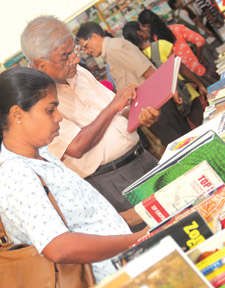Extinct is not forever
 When the printed book has become an endangered species the book
publisher and the distributor too face extinction, which would be
followed by the extinction of the annual international book fairs around
the world, unless they can create a miracle to revive the dying book. When the printed book has become an endangered species the book
publisher and the distributor too face extinction, which would be
followed by the extinction of the annual international book fairs around
the world, unless they can create a miracle to revive the dying book.
But the extinction of the book does not mean it would be forever, as
in the case of our endangered plants and animals, because books will
continue to be conserved in libraries and museums, in usable and
readable form.
The only other option for the publisher is to move on with the times
and with the technology to publish and market ebooks both in the written
form and as audio books.
This requires the publishers to realize and accept the reality, and
convince themselves to like the ebook. Today when some publishers
themselves lament that ebooks will never become popular, they are only
repeating the mistake made by the business community all through our
history. When the first computer was developed and marketed by IBM, its
chairman Thomas J. Watson is claimed to have said “I think there is a
world market for may be five computers”. There is no record of such a
statement by Watson.
History repeated itself when the digital camera was introduced.
Photographers lamented that there was nothing like using a twin lens
reflex camera under the user's total control. Manufacturers too would
have hesitated at first. But today complete amateurs and even little
kids just point and shoot, so much so that Kodak went nearly out of
business, and in 2006, Nikon announced the discontinuation of all but
two of their models of film cameras. Even the digital camera by itself
is faced with heavy competition, and has become endangered with the
arrival of high quality cameras in mobile phones, which are becoming
hand held computers, book readers, web browsers, electronic mailbox and
audio video player in addition to being a telephone.
 |
|
Browsing through the books. Picture by
Nissanka Wijeratne |
There are those who claim they want to feel the book in their hand
and smell it and touch it and turn the pages.
We can still get used to feel the hand held ebook reader and get used
to its own smell or the smell of the leather cover, or someone might be
able to introduce a synthetic aroma to last a long time whenever the
e-reader is switched on. We do turn the pages by touch or the flick of
the button.
The black print on white paper is completely simulated now in the new
readers. So too the rustle of a page being turned.
The Book Fairs will become extinct long before the book, because
already book publishers are displaying their books online, where we can
go through the books, sometimes even read a few pages, then order them
on-line, to be delivered at our doorstep, or immediately on our screen.
There would be a permanent, year round international book fair at our
fingertips, a virtual book-shop.
We would not have to worry about traffic, about parking, about huge
crowds or about the amount of time to be spent searching for the books
we want, or even searching the book-stall we want.
The writers too need not worry about finding a publisher or a
literary agent or facing rejections.
The stigma of the self-published book is gone today with online and
print-on-demand publishing where the author need not invest his hard
earned money for printing costs. The author could publish on-line by
themselves or go to an ebook publisher and just wait for the book to be
read around the world and for his royalties to be transferred to his
bank account.
Even for the lovers of the printed book, already book dispensers are
available in several countries now, where we could select the book on
the display screen, pay on line or with cash or credit-card, and then
have the patience to wait for a few minutes till the book gets printed,
bound and slips out of the printer in a ready-to-be-read condition. In
such a world, the heavy industrial printing machines, huge warehouses
for storage of books, and bookshops with their hundreds or thousands of
books on display would also die a slow death, whether we like it or not.
Some practices return to us in other guises. Some of us still enjoy
eating flesh of dead animals burnt over a fire, but we try to add
respectability by calling it a barbeque.
Our mind is still haunted by pre-historic memories of our
cave-dwelling days and so we pay exorbitant prices to spend a night in a
jungle hideout, which is actually a star class hotel in disguise. In the
same manner, printed books will also still be available, at mind
boggling prices, under the guise of coffee-table books or to line the
walls of the sitting rooms to impress the guests. In USA The Strand and
other used book suppliers could continue to sell books by the feet or by
the yard.
Development has always meant destruction, destruction of our
environment. Yet the development of the electronic book is one
development which can be hailed as a really nature-friendly progress,
which does not create a conflict with nature and culture, because we
would be saving millions of trees and cutting down on pollution in
manufacturing paper.
Our publishers too are accepting the reality, as during the 2012 book
fair, Sarasavi launched the first Sinhala audio-novel by Badraji
Mahninda Jayatilaka. “The old order changeth, yielding place to new..”
[email protected]
|





